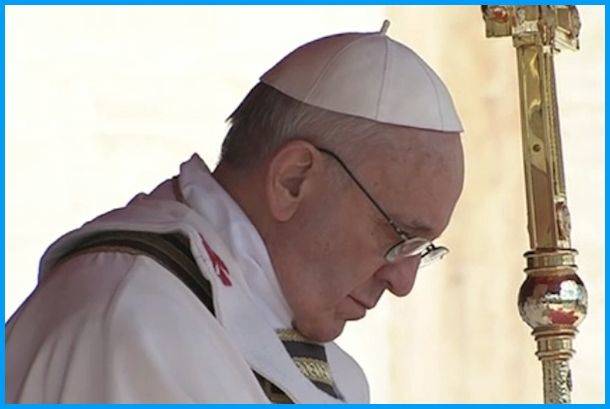Pope, Peace and 100,000 at Prayer
VATICAN CITY - The crowd singing, meditating and praying in St. Peter's Square Saturday evening was immense, the response to Pope Francis's appeal to believers, including Muslims, and non-believers as well to join together in a day of fasting and prayer for peace, not only Syria but also in Lebanon, Irak, Palestine, Israel and Egypt. Italian police estimate that as many as 100,000 participated. They included leaders of non-Catholic faiths as well as Catholics. The Pontiff's message was clear and emphatic: "Let the cry for peace rise up across the earth," he declared. "We have perfected our weapons but put to sleep our consciences." Pope Francis, who appeared wearing a simple white cassock, specifically denounced the use of chemical weapons while taking care not to place blame on either side.
But in some ways the real message was the massive participation at the four-hour vigil, which demonstrated, as do the crowds flocking to the Wednesday papal audiences, the pontiff's extraordinary popularity and influence. Through the media this message circled the globe, extending into Syria. From Damascus Archbishop Mario Zenari, who is a native of Verona and the papal nunzio (that is, ambassador) in Syria, predicted on Vatican Radio that, "The words of the Holy Father will carry weight." Papal diplomats have been working for months behind the scenes in favor of an immediate cessation of violence, and earlier last week a senior Vatican spokesman had warned that the Syrian conflict risked igniting "a world war." Earlier Catholic Bishop Antoine Audo of Aleppo had cautioned that, "War will not take us anywhere--the only road to peace is dialogue."
Among the many who elected to fast for peace with the Pontiff were actor Dario Fo, architect Renzo Piano, singers Gianni Morandi and Adriano Celentano and Foreign Minister Emma Bonino. Later Bonino was reportedly irritated at Premier Enrico Letta's signing for Italy, at the just concluded G20 meeting in St. Petersburg, a statement together with Britain, France and Spain calling for a "strong response." to the events in Syria. Italian politicians at the vigil in St. Peter's included the President of the Chamber of Deputies Laura Boldrini, Defense Minister Mauro Mauro and Rome Mayor Ignazio Marino.
For Pope Francis, this was his first public venture into international politics. Vatican observers point out that his taking a particularly active role in diplomacy reflects that, as a Latin American, his vision is global; even as a cardinal he had sent one of his priests from Argentina to study Arabic in Cairo. Not coincidentally, in recent months the Vatican has been publishing its press releases in Arabic as well as European languages. "Francis is convinced that all religions can unite together to combat the evil that lies within each of us," as one Italian observer put.
Speaking from the pulpit of the basilica on Sunday morning, the Pope denounced the clandestine arms market. "Is this war truly a war for something, or does it serve for the illegal business of selling arms?" he asked. "One must say 'no' to fratricide violence and to the lies which spur this on, and to the proliferation of weapons and their illegal commerce." This has long been a goal of Vatican diplomacy, including at the United Nations, and on September 5 the Vatican's new foreign affairs minister, Archbishop Dominique Mamberti, spoke to the 71 ambassadors to the Holy See in Rome to outline the position of the Holy See with regard to Syria. In a paper the Archbishop presented there the emphasis was on preservation of the unity and territorial integrity of Syria. This is in apparent contradiction to a US suggestion of creation of a Christian enclave of some sort in the North of Syria.
The Vatican is deeply concerned for the fate of Christian and particularly Catholic communities in Syria as well as the rest of the Middle East. It learned today, with consternation, that the small town of Malula, near Damascus, had fallen to rebel forces. The town, a popular destination for pilgrims and tourists, is renowned for the fact that it is a very ancient Christian community where at least some still speak the language of Jesus Christ, Aramaic. The fighting sent the inhabitants fleeing from town, to bolster the numbers of Christian refugees, who are among the 4 million displaced persons inside Syria; another 2 million have crossed borders. "There is underlying fear that in Syria's future there will be no room for religious minorities such as Christians," according to reporter Andrea Tornielli, writing in Vatican Insider.


































i-Italy
Facebook
Google+
This work may not be reproduced, in whole or in part, without prior written permission.
Questo lavoro non può essere riprodotto, in tutto o in parte, senza permesso scritto.